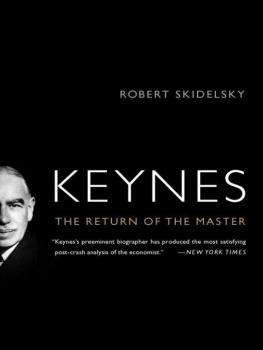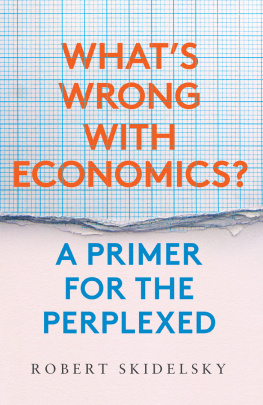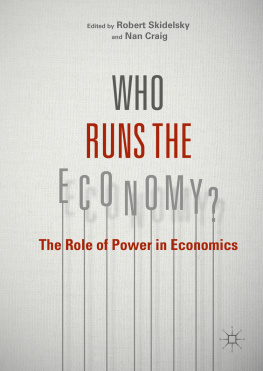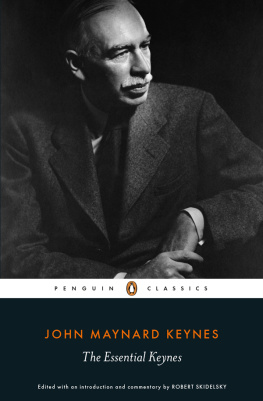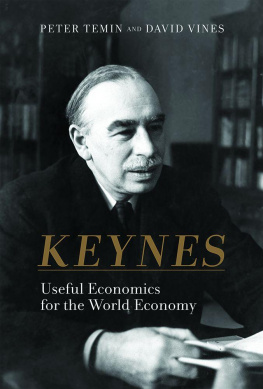Table of Contents
Praise for Keynes: The Return of the Master
A FINANCIAL TIMES BEST BOOK OF THE YEAR A TELEGRAPH (UK) BEST BOOK OF THE YEAR A TIMES LITERARY SUPPLEMENT BEST BOOK OF THE YEAR A BUSINESSWEEK BEST BOOK OF THE YEAR
[A] useful and important introduction to what a modern Keynesianism might look like.... Convincing.
New York Times Book Review
Valuable.... A neat synthesis: a first-rate short biography for those who have avoided knowing the man behind the myth until now; a clearly written and accessible timeline of just how and why the current crisis broke upon us; and a clearly stated argument for why Keynes was both right and why his precepts must be followed once again.
Washington Times
The most satisfying post-crash analysis of the economist.
New York Times
The book offers clear and cogent critiques of modern macroeconomic thought...
Foreign Affairs
Explaining the present-day relevance of [Keynes] theories is executed superbly by Skidelsky.... Skidelskys book excels. Its a passionate polemic that makes a strong case for economists and policymakers to reread their Keynes.
BusinessWeek
Skidelskys summary of what is distinctive in Keyness theory is excellent.
The New Republic
As ever, Keynes lights the path to economic enlightenment. Robert Skidelskys superb short new biography, Keynes: The Return of the Master , shows us how revolutionary was Keynes thinking in the 1920s and 1930s, and how, until now, it was never properly applied.
Arts & Book Review
A profound and beautifully written meditation on the dangers of bad ideas, readily accessible to anyone who isnt mystified by the headlines in the Wall Street Journal or the Economist .
Commonweal
Skidelsky deftly summarizes and explains basic Keynesian economics and how they apply to our current travails.
Salon
Enjoyable and stimulating.
Commentary
[H]istorically thorough and thoughtful.
Las Vegas Business Press
It sparkles with insight, clarity and intellectual brilliance.... Skidelsky is at his best in dissecting the failure of economics and his advocacy of a broader economics degree which embraces economic history.
Bill Jamieson, living.scotsman.com
An elegant and forthright book... Full of arresting insights, writtendespite its complex and heavyweight subject matterwith a captivating lightness of touch.
Sunday Times (UK)
[T]his book serves as an excellent addendum and update to Skidelskys three-volume biography of Keynes.
Telegraph (UK)
The chronological section of Skidelskys book is easily the best account I have read of the development of the credit crunch, for those interested in the main macroeconomic story as distinct from the micro-financial nitty-gritty.
Financial Times (UK)
Wonderfully lucid.... Ought to be considered required reading for every prospective minister.
Roy Hattersley, Guardian (UK)
An important contribution at a time of soul-searching, a must read even if one doesnt fully accept its conclusions.... This is a wonderfully stimulating book, one that reflects the authors unparalleled erudition. Were living in the second Age of Keynesand Robert Skidelsky is still the guide of choice.
Observer (UK)
To Mikhail Gutseriev
Preface to the paperback edition
This is a partly re-written version of the hardback edition of Keynes : The Return of the Master , published in September 2009. Since the book first appeared, recovery has started after the biggest global downturn since the Second World War. In chapter one, I have taken the opportunity to bring the story of the slump and its aftermath up-to-date. The paperback also reflects the way attention has shifted from how to avert a collapse to how to sustain a fragile recovery. In the early days of the slump there was almost unanimous support for government stimulus policies to arrest the slide into another great depression. Today the main question concerns the sustainability of the expanded government deficits and national debts incurred to fight the recession. Should the stimulus packages be quickly withdrawn or do economies need to remain longer on life-support systems? This is as much a matter of theory as of reassuring the markets.
The stampede to austerity, before recovery is secure, is depressing testimony to how skin-deep the revival of Keynes has been. Unless the policy of ending the stimulus is reversed or modified, we in the west will face years of stagnation and under-employment. In combating the financial seizure, early efforts were concentrated on bailing-out insolvent banks. Today the discussion of how to reform the banks has become more sharply defined, with opinion split between greater regulation and breaking-up integrated banking systems into functional components. Discussion of the future aims of macroeconomic policy, and on reforming the world monetary system have not got far, but I have indicated what Keynes might have thought about these matters.
Above all, criticisms of the hardback have stimulated further thoughts of my own about the state of economic theory and its contribution to the crisis. I have tried to sharpen my discussion of Classical theory, Keyness theory, New Classical theory, and New Keynesian theory. On one matter, I am unrepentant. Some reviewers accused me of vulgarising the orthodox theories which seemed to me, and still seem to me, to be at the root of the crisis. I had not taken sufficient account, it was said, of the qualifications and exceptions to the theory of efficient markets which their own academic advocates recognized, or of the variety of opinion which exists within the economics profession. My defence to the second charge is that the theories of the Chicago School have been dominant, for the last thirty years, with dissenters pushed to the margins of the profession. As for the first charge, theories are always applied in their vulgarized form, and it ought to be the test of a good economic theory that its vulgarization does not lead to bad policy.
In any case, my objection is not primarily to the content of most contemporary economic theory, but to a method of theorising which inevitably produces models of economic life which have little relation to reality.
Robert Skidelsky, June 2010
Preface
The economist John Maynard Keynes is back in fashion. That guardian of free-market orthodoxy the Wall Street Journal devoted a full page spread to him on 8 January 2009. The reason is obvious. The global economy is slumping; stimulus packages are all the rage. But Keyness importance is not just as a progenitor of stimulus policies. Governments have known how to stimulate sickly economies - usually by war - as long as they have known anything. Keyness importance was to provide a general theory which explains how economies fall into slumps, and to indicate the policies and institutions needed to avoid them. In the current situation no theory is better than bad theory, but good theory is better than no theory. Good theory can help us avoid panic responses, and give us insight into the limitations of both markets and governments. Keynes, in my view, provides the right kind of theory, even though his is clearly not the last word on events happening sixty-three years after his death.

